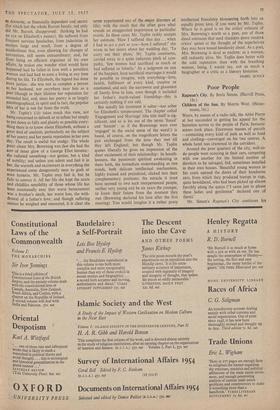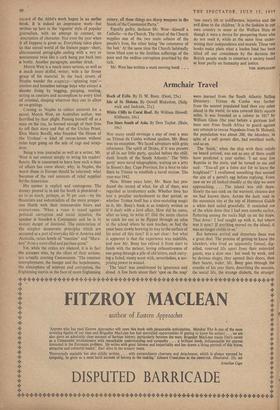Poor People
Children of the Sun. By Morris West. (Heine- mann,16s.)
WHEN, by means of a radio talk, the Abbe Pierre at last succeeded in getting his appeal for the homeless across to the people of Paris, fantastic scenes took place. Enormous masses of parcels —containing every kind of junk as well as food and clothing—converged on his two centres. A whole hotel was crammed to the corridors.
Around the poor quarters of the city, well-to- do people went scouring in their cars, competing with one another for the limited number of derelicts to be salvaged, fed, sometimes installed in their own houses. 'Beautiful young women in fur coats opened the doors of their handsome cars, from which they produced tramps in rags, quite bewildered, who had been picked up almost forcibly along the quays ("I came just to please these ladies and gentlemen" declared one of them).'
Mr. Simon's Ragman's City continues his record of the Abbe's work begun In an earlier book. It is indeed an impressive work—but written up here in the 'vignette' style of popular journalism, with no attempt to connect, no description of character. Not even the year when it all happens is given us. Everything takes place in that unreal world of the feature pages—short, disconnected paragraphs ending with a wry or sentimental twist like a cork being put back into a bottle. Another paragraph; another drink.
Morris West is a much more serious, as well as a much more' skilful, writer; with a far firmer grasp of his material. In the back streets of 1Naples wander the scugnizzi—'spinning tops'— aimless and homeless teenage boys who extract a slender living by begging, pimping, stealing, acting as couriers and accomplices to every kind of criminal, sleeping wherever they can in alleys or on gratings.
Coming to Naples to collect material for a novel, Morris West, an Australian author, was horrified by their plight. Passing himself off as a *man on the run, he learned enough of their lives t o tell their story and that of the Urchin Priest, Don Mario Borelli, who founded 'the House of the Urchins'—a kind of rescue-home without rules kept going on the sale of rags and scrap- iron.
Being a true journalist as well as a writer, Mr. 'West is not content simply to wring his readers' hearts. He is concerned to learn how such a state of affairs has come about; why, in Naples, the worst slums in Europe should be tolerated; what becomes of the vast amounts of relief supplied by the Americans.
His answer is explicit and courageous. The money poured in to aid the South is plundered— as to as much, perhaps, as 70 per cent.—by the financiers and industrialists of the more prosper- ous North with their innumerable fixers and contact-men. 'When a voice is raised against political corruption and social injustice, the speaker is branded a Communist and he is in instant danger of dismissal. The enunciation of the simplest democratic principles which are accepted as a part of everyday life in America and Australia, raises howls of "reaction" and "Marx- ism" from a controlled and partisan press.'
Yet, while the critics are silenced, it is in fact the accusers who, by the effect of their actions, are actually creating Communists. 'The constant unemployment, the hunger and the hopelessness, the atmosphere of mistrust and corruption, the frightening inertia in the face of more frightening misery, all these things are sharp weapons in the hands of the Communist Party.'
Equally guilty, declares Mr. West—himself a Catholic—is the Church. The ritual of the Church supplies one of the two main solaces of the people's lives, the other being 'the commerce of the bed.' At the same time the Church habitually turns blind eyes to the limitless sufferings of the poor and the endless corruption practised by the rich.
Mr. West has written a most moving book . . . 'one man's tilt at indifference, injustice and the evil done to the children.' It is the fashion in our own country to sneer at the Welfare State as though it were a device for pampering those who do not need it, while at the same time under- mining their independence and morale. These two books make plain what a leaden load has been lifted off our consciences by the decision the British people made to construct a society based at least partly on humanity and justice.
TOM HOPKINSON















































 Previous page
Previous page